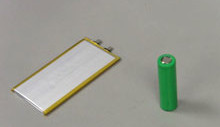Non-heating lithium-ion batteries in the making
on

California-based company Leyden Energy is currently working on developing a new type of chemistry for lithium-ion batteries. If these efforts succeed, then experts here may develop batteries that do not overheat like traditional ones do, leading to new applications.
One of the most exciting prospects is the use of Li-Ion batteries in electric vehicles. This could mean that the automotive industry might become more receptive to creating such vehicles in the near future.
Generally, in hybrid and electric cars, high-density batteries come with safety risks, mostly caused by the fact that they overheat. But the
In order to achieve this ability, the company turned to using a graphite current collector, while inserting sodium imide inside the battery's electrolyte. What these materials do is they allow the power storage unit to last longer, and withstand higher operations temperatures.
The company is however keeping its lips sealed on how its engineers managed to achieve higher energy densities, of up to 225 watt-hours per kilogram. This level of efficiency is about 50 percent higher than that achieved by existing electric vehicle batteries and comparable to that of high-end laptop batteries.


Discussion (0 comments)